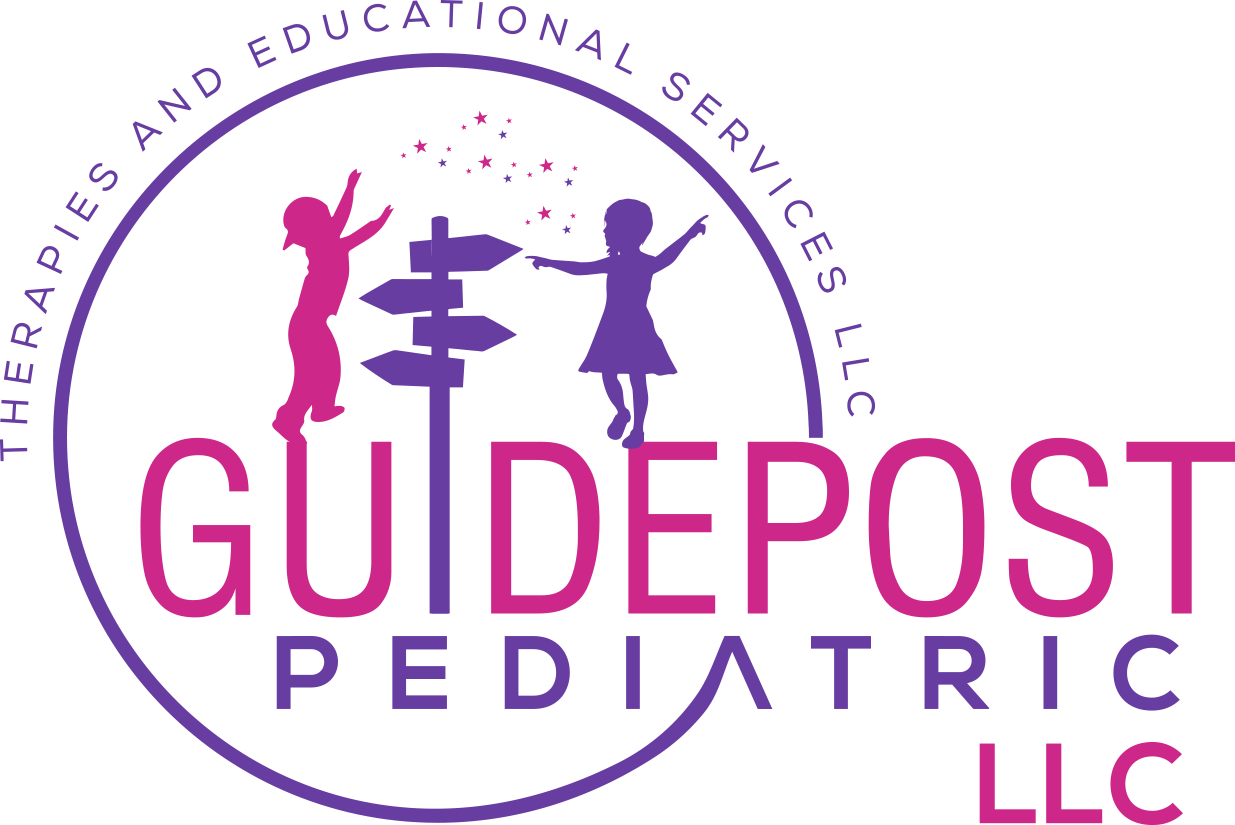Guidepost Pediatric Therapies and Educational Services
What to Expect When You Arrive
GuidePost Pediatric Therapies and Educational Services are here for you!
Start Here
Step 1: If you haven't already, explore our Pediatric Educational Services page or Pediatrics Therapy page of this site and explore all that Guidepost has to offer your child.
Step 2: If in need of pediatric therapy, review the information regarding the therapy evaluation process below.
Step 3: Call 907-376-4880, email us at guidepostpediatrics@gmail.com or fill out a contact form here with any questions you might have. Be ready with pediatrician contact info, demographic and insurance info. GPTES accepts Alaska Medicaid for every therapy ( except behavioral health) , Tricare ( for every therapy including behavioral health), In-Network BC/BS ( for every therapy including behavioral health) Aetna, EBMS and all other major insurance payers. Guidepost Pediatrics verifies benefits as a curtesy to families. Be sure to also verify benefits with your insurance as best practices before treatment. Co-pays are expected day of treatment.Guidepost Pediatrics does not carry balances longer than 30 days as of January 1, 2023.
Step 4: Let’s get started! Fill out an evaluation form here to request a therapeutic evaluation for your child, or fill out a tutoring/testing request form here to get started with educational services. Guidepost Pediatrics offers discount tutoring packages.
We know that seeking the right kind of support for your child can be confusing at first. Starting with your first phone call, or email, we are here to help with every step. Our friendly administrative staff is skilled at answering common questions in order to help guide you towards the most appropriate evaluation for your child. Once scheduled, your evaluating therapist or educational services provider will give you a call. Please take some time to fill out all pertinent intake forms and bring them to your first appointment. This allows us to understand your needs and to learn about your child beforehand facilitating a smooth, stress free visit.
Your child’s evaluation is aimed at understanding your child's developmental and foundational needs and patterns. You know your child better than anyone, so the information you provide us with is very important. In addition, reports from teachers and previous professionals may also be helpful in establishing these patterns. We follow all HIPAA guidelines (Health Insurance Portability and Accountability Act of 1996) and will not discuss anything with anyone you do not give us permission to. If you would like for us to speak with someone in order to obtain more information we will ask for a signature to request this.
What happens in our first Therapy Visit?
When you and your child come to the initial evaluation, you will be greeted by one of our friendly and personable front office administrators in a relaxing and engaging waiting room complete with coffee bar and comfortable furniture to decompress. Depending on the age of your child and what tests are required, your therapist may ask you to come into the evaluation area with them, observe through a one way window or wait in our waiting room during the evaluation process. We find that most children age two and older, will actually do much better when they are working with the therapist one-on-one. This allows us to observe your child independently from you so that we can give you an accurate assessment based on standardized means.
We are used to children who have difficulty separating. All Guidepost therapists are exceptionally skilled at motivating young children and aim to have the initial evaluation process as stress free as possible for everyone. Even the most vocal of children tend to settle quickly into the environment given the chance. Most have the hardest time leaving at the end.
What happens during an evaluation?
Prior to offering physical or occupational therapy for example, your child will be evaluated for a full sensory motor evaluation, plan on your child working with her therapist for at least one to two hours during the initial testing. The time spent will depend on your child’s age, endurance and situation. Sensory motor testing is typically fun and engaging, consisting of various age appropriate motor activities (ball skills, balancing skills, visual motor activities, stacking blocks & stringing beads, imitating body positions etc.) We will also be observing your child in a unstructured gym environment where we can observe play preferences and how he uses his body to explore novel equipment (various hanging swings, climbing walls, slides, tunnels, crash mats, ball pits and more.)
What happens after we leave?
If your child received a full therapeutic evaluation, we will schedule you to come back for an hour-long parent conference with the evaluating therapist. Your therapist will have scored all of the objective tests and prepared a full written report for you. This report can be up to 10-12 pages in length and will include all results, observations, assessment and recommendation. To allow for time to complete this report, conferences are typically scheduled 1-2 weeks after the initial evaluation. If you need results sooner than this be sure to let us know.
How soon can we start therapy?
If the evaluation indicates that therapy would be beneficial for your child we can start as soon as we obtain a doctor's order. Physical, occupational and speech therapies are considered medical treatments and usually require a doctor's order. Tricare patients will require a prior authorizations for all services but tutoring. In many cases insurance will reimburse for treatment when the medical need is documented in the evaluation. We will fax a treatment request to your pediatrician or referring physician, which your doctor will sign and fax back for our records. Once the evaluation is completed we will send it to the referring physician. We also work directly with educational programs in the State of Alaska to support child therapy needs. If you have any questions or we can support you in any way, please contact us today.




